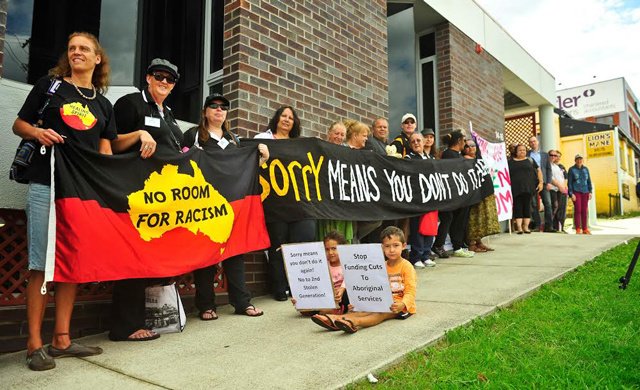
Aboriginal communities from across Australia met in Brisbane on July 11 to attend a day of protest and planning against the ongoing removal of children from Aboriginal families.
Aunty Karen Fusi from the Brisbane Aboriginal Sovereign Embassy and Aunty Hazel Collins from Grandmothers Against Removal Gunnedah told the National Forum Against Ongoing Stolen Generations that child removal is having devastating effects on families and communities.
Uncle Lionel Fogarty said removing children from their communities undermined the ability to pass on culture: “Knowing your roots, your law, your language and culture, is where strength comes from and all the different mobs have shown by their commitment to the shared struggle that spirit comes from the heart.”
Uncle Coco Watson Wharton from the Brisbane Aboriginal Sovereign Embassy said the struggle for justice today is the same struggle announced at the 1938 Day of Mourning protest: “We are still fighting for our land and for the return of our children to this day. The day we stop fighting is the day that we lose.”
Mary Moore from Australian Legislative Ethics Commission said that in the past five years, the commission's auditing of child protection cases across Australia uncovered poor compliance with the law, mostly by workers with inadequate training.
Paddy Gibson from the Intervention Rollback Action Group in Northern Territory said a recent court ruling against the Department of Children and Families came after a renewed struggle against child removal in the NT.
A panel titled “The Validity of Law: First Nations Vs. Colonial” was held, where speakers proposed that re-establishing a council of elders would strengthen authority from within the community.
When discussing child removal, all panel presenters discussed the need for accountability and transparency in the process of removal and placement. Participants from the floor discussed how the process assumes guilt, putting the onus on families and communities to prove their innocence.
Debra Swan, a recently resigned Department of Family and Community Services (NSW) senior case worker, said individuals and families were unable to access evidence being used against them to prove they are unable to provide care. Those with claims made against them do not have to be notified, and have no process to find out why there is a claim against them.
Indigenous Lawyer of the Year Cheryl Orr discussed kinship placement. She said that, in her experience, families are rarely told of a removal, which cuts off children from the very people who are best suited to be carers.
“You should be telling the lawyer what to do, not the other way around. If they tell you to settle and you don’t want to, then don’t,” she said.
Participants were also given information about their rights when dealing with the Department of Communities Child Safety and Disability in Queensland. An information sheet for the Northern Territory system is being developed. Visit the website for more information.
Like Green Left Weekly on Facebook and follow us on Twitter.